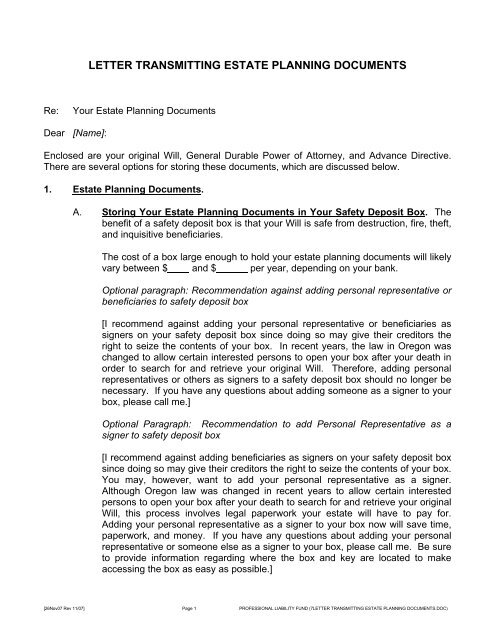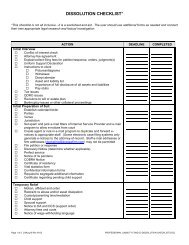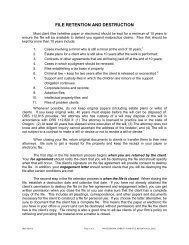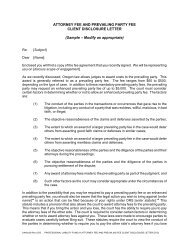letter transmitting estate planning documents - Professional Liability ...
letter transmitting estate planning documents - Professional Liability ...
letter transmitting estate planning documents - Professional Liability ...
Create successful ePaper yourself
Turn your PDF publications into a flip-book with our unique Google optimized e-Paper software.
LETTER TRANSMITTING ESTATE PLANNING DOCUMENTS<br />
Re:<br />
Your Estate Planning Documents<br />
Dear [Name]:<br />
Enclosed are your original Will, General Durable Power of Attorney, and Advance Directive.<br />
There are several options for storing these <strong>documents</strong>, which are discussed below.<br />
1. Estate Planning Documents.<br />
A. Storing Your Estate Planning Documents in Your Safety Deposit Box. The<br />
benefit of a safety deposit box is that your Will is safe from destruction, fire, theft,<br />
and inquisitive beneficiaries.<br />
The cost of a box large enough to hold your <strong>estate</strong> <strong>planning</strong> <strong>documents</strong> will likely<br />
vary between $ and $ per year, depending on your bank.<br />
Optional paragraph: Recommendation against adding personal representative or<br />
beneficiaries to safety deposit box<br />
[I recommend against adding your personal representative or beneficiaries as<br />
signers on your safety deposit box since doing so may give their creditors the<br />
right to seize the contents of your box. In recent years, the law in Oregon was<br />
changed to allow certain interested persons to open your box after your death in<br />
order to search for and retrieve your original Will. Therefore, adding personal<br />
representatives or others as signers to a safety deposit box should no longer be<br />
necessary. If you have any questions about adding someone as a signer to your<br />
box, please call me.]<br />
Optional Paragraph: Recommendation to add Personal Representative as a<br />
signer to safety deposit box<br />
[I recommend against adding beneficiaries as signers on your safety deposit box<br />
since doing so may give their creditors the right to seize the contents of your box.<br />
You may, however, want to add your personal representative as a signer.<br />
Although Oregon law was changed in recent years to allow certain interested<br />
persons to open your box after your death to search for and retrieve your original<br />
Will, this process involves legal paperwork your <strong>estate</strong> will have to pay for.<br />
Adding your personal representative as a signer to your box now will save time,<br />
paperwork, and money. If you have any questions about adding your personal<br />
representative or someone else as a signer to your box, please call me. Be sure<br />
to provide information regarding where the box and key are located to make<br />
accessing the box as easy as possible.]<br />
[26Nov07 Rev 11/07] Page 1 PROFESSIONAL LIABILITY FUND (7LETTER TRANSMITTING ESTATE PLANNING DOCUMENTS.DOC)
B. Storing Your Will in Your Home. The benefit of storing your Will at home is<br />
that your Will is easily accessible. Unfortunately, this can also be a<br />
disadvantage. It is possible for an angry beneficiary to obtain your original Will<br />
and destroy it before other beneficiaries discover what has happened.<br />
Storing a Will at home without the benefit of a locked, fire-proof box or safe also<br />
means that it is vulnerable to theft, fire, or other destruction. If something should<br />
happen to your Will, please contact me at once so I can prepare a replacement<br />
original for you to sign.<br />
C. Storing Your Will at Home in a Fire-Proof Box or Safe. Many clients choose<br />
this option over a safety deposit box. While fire-proof boxes can be a good<br />
storage alternative for purposes of protecting your Will, they can also be a target<br />
for thieves. Please keep this in mind when deciding how to store your Will. Also,<br />
be sure your personal representative knows where the box or safe is located, as<br />
well as how to access the box or safe, if locked.<br />
2. General Durable Power of Attorney.<br />
Your original General Durable Power of Attorney and Letter of Understanding should be<br />
stored in a safe, accessible location, such as [insert appropriate language]. 1<br />
3. Advance Directive.<br />
Your heirs, loved ones, or health care providers may need access to your original<br />
Advance Directive on very short notice. Although safety is always a consideration,<br />
quick accessibility is the most critical factor in choosing a storage location for this<br />
document. I recommend that you give a copy of your Advance Directive to your health<br />
care representative and your primary care physician so this important document is<br />
easily accessible if it becomes necessary.<br />
Enclosed is a <strong>letter</strong> to send to your personal representative advising [him/her] as to the<br />
location of your <strong>estate</strong> <strong>planning</strong> <strong>documents</strong>. If you have any questions regarding the above,<br />
please give me a call.<br />
Very truly yours,<br />
[Attorney]<br />
[Firm]<br />
Enclosures<br />
1 The PLF recommends that lawyers not retain any original client <strong>documents</strong>, including General Durable Powers<br />
of Attorney and Advance Directives. These <strong>documents</strong> are best stored in a location that is readily accessible to<br />
the client and/or agent, yet safe from theft, fire, etc.<br />
[26Nov07 Rev 11/07] Page 2 PROFESSIONAL LIABILITY FUND (7LETTER TRANSMITTING ESTATE PLANNING DOCUMENTS.DOC)

















